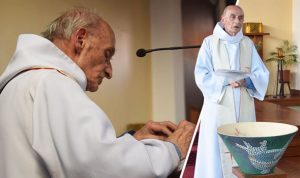I’ve been reading Bevin Alexander’s interesting book, How Wars Are Won. He tells of several different tactics that are incredibly effective in warfare. One of them that is being used against the Catholic Church at the moment is Holding One Place, Striking Another. In this tactic, an army is forced into committing its resources to defense in one place, leaving itself vulnerable to attack in another place.

This has happened to the Church before, and for similar reasons: the Church is currently fighting in the press for its validity as a moral voice, given some corruption that has plagued her from within.
As everyone who is close to the Church knows, the corruption is nowhere near the main story of the Church, and is in fact part of the story of every institution involving fallen humanity. However, at the moment it is the part of the story that is most widely known. It is exacerbated not only from without but from within, by those who are building careers on criticizing the Church.
While the Church spends resources defending her virtue and her credibility to speak as a moral voice, and while burdened with the enormous strain of the coronavirus problem, she is under a true, astonishingly brazen and widespread attack.
Statues too numerous to recount, and too shocking to reprint, have been vandalized in a Cromwellian orgy of iconoclasm, led by both neo-communist cancel culture activists and satanists.
So how do we win this war?
One tactic can be taken from yesterday’s Office of Readings, the attack on Jehosaphat by three armies, from 2 Chronicles 20. The attackers are not at peace with one another, and are already destroying one another. No group of revolutionaries is at peace for long. Judah needed only to fast, pray, and stand firm.
Another effective tactic suggested by Bevin Alexander is the Feigned Retreat. Withdrawing in an orderly fashion and regrouping, an army draws a pursuing enemy forward in disorder, leaving them vulnerable to effective counterattack. For us as Catholics, this counterattack takes several forms, all of them works of mercy. I would suggest that the very first is a vigorous teaching of the Gospel in all its fullness–because our victory will be complete when our enemies become our friends, and friends of God.
This is an election year in the United States, and one of the concerns is that an oppressive regime, opposed to religious freedom, may ascend. That would indeed be tragic, but it is important to recall that the Lord was born under Herod the Great and rose under Pontius Pilate. The word of God is not chained.
Ten days after the martyrdom of the Martyrs of Compiègne, the Reign of Terror ended. Hopefully most of us will not have to be heroes in the same way, but we can make our contributions. We have the weapons of the divine Holy Spirit, Who cannot fail, and Who manifests His presence in many ways:
- The bishop who rallies his diocese and his brothers, and preaches with fire.
- The priest who through many distractions turns to his breviary first of all, every day.
- The wife who makes do with less.
- The husband who listens and consoles, protects and encourages.
- The church musicians who have begun preparing for Christmas, not at all sure their jobs will last that long.
- The penitent who confesses the same sin of weakness again and again, trusting in the graces of forgiveness and healing.
